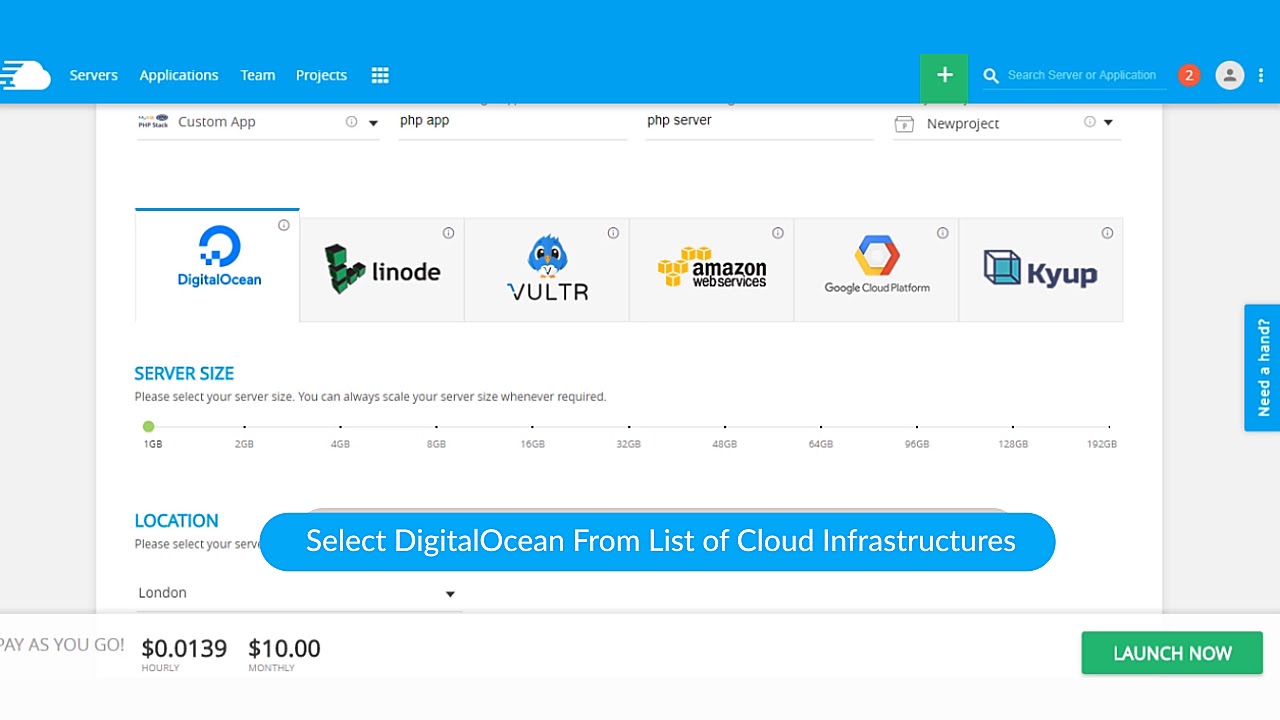Introduction
In the digital age, having an online presence is crucial for individuals and businesses alike. Whether you want to start a personal blog, create an e-commerce store, or establish a professional website for your company, two essential components you need to understand are web hosting and domain names.
Web hosting is the process of storing your website’s data on a server, making it accessible to users around the world. It is like renting space on the internet to store your website’s files, images, and other content. On the other hand, a domain name is the unique address that visitors use to reach your website. Think of it as your online address, similar to a physical address for a brick-and-mortar store.
Understanding the relationship between web hosting and domain names is crucial for building and maintaining a successful online presence. In this article, we will explore the different types of web hosting and domain names, the considerations you should keep in mind when choosing a hosting provider, and the significance of reliable hosting for your website’s performance.
Having a solid understanding of these concepts will enable you to make informed decisions when it comes to selecting the right web hosting provider and domain name for your specific needs. So, let’s dive in and explore the world of web hosting and domain names together.
What is Web Hosting?
Web hosting refers to the process of storing and providing access to the files and data that make up a website. When you create a website, it consists of various files, such as HTML, CSS, JavaScript, images, videos, and more. These files need to be stored on a server, which is a powerful computer connected to the internet 24/7. This server ensures that your website is always accessible to users around the world.
The server acts as a storage space for your website’s files, ensuring that they are securely stored and readily available when someone visits your site. When a user types your domain name into the browser, the browser sends a request to the server where your website is hosted. The server then retrieves the necessary files and delivers them to the user’s browser, allowing them to view your website.
Web hosting providers offer different types of hosting plans, each with its own set of features and resources. These plans allow you to choose the hosting environment that best suits your needs and budget. Some of the most common types of web hosting include shared hosting, virtual private server (VPS) hosting, dedicated hosting, cloud hosting, and managed WordPress hosting.
Shared hosting is the most affordable and beginner-friendly option. With shared hosting, your website shares server resources with other websites. This can lead to slower loading times if one website on the server receives a high volume of traffic. VPS hosting provides a balance between affordability and control, as it offers virtual server partitions with dedicated resources. Dedicated hosting gives you complete control over a physical server, but it is more expensive. Cloud hosting utilizes multiple servers, ensuring high scalability and reliability. Finally, managed WordPress hosting is specifically optimized for WordPress sites, offering enhanced security and performance.
Web hosting is a fundamental aspect of building a website. It ensures that your website is accessible to visitors and provides a reliable and secure environment for your files and data. With the right web hosting provider and plan, you can ensure a seamless user experience and maximize the performance of your website.
Types of Web Hosting
When choosing a web hosting plan, it’s important to understand the various types available. Each type of web hosting offers different features, resources, and levels of control. Let’s take a closer look at the most common types of web hosting:
- Shared Hosting: Shared hosting is a popular and affordable choice for beginners. With shared hosting, multiple websites share the same server resources, such as CPU, RAM, and disk space. While this makes it cost-effective, it also means that if one website receives a high amount of traffic, it could affect the performance of other websites on the same server. Shared hosting is suitable for small personal blogs or websites with low to moderate traffic.
- Virtual Private Server (VPS) Hosting: VPS hosting provides a balance between affordability and control. It offers virtual server partitions within a physical server, allowing each website to have dedicated resources. This means that your website’s performance won’t be affected by other websites on the same server. VPS hosting gives you more control over your hosting environment, including the ability to customize server settings. It is suitable for growing websites or businesses that require more resources and control.
- Dedicated Hosting: Dedicated hosting provides the ultimate level of control and resources. With dedicated hosting, you have an entire physical server dedicated to your website. This means you have full control over server settings, security measures, and can handle high traffic volumes without affecting performance. Dedicated hosting is ideal for large businesses or websites that require maximum performance and security.
- Cloud Hosting: Cloud hosting utilizes multiple servers to distribute resources and ensure high availability. This means that if one server fails, your website will still remain online as it automatically shifts to another available server. Cloud hosting offers scalability, as you can easily add or remove resources based on your needs. It is suitable for websites with unpredictable traffic spikes or businesses that require flexible and scalable hosting.
- Managed WordPress Hosting: Managed WordPress hosting is specifically designed and optimized for WordPress websites. It offers enhanced security, automatic updates, and specialized technical support. With managed WordPress hosting, the hosting provider takes care of all the technical aspects, allowing you to focus on creating and managing your website content. This type of hosting is ideal for WordPress users who want a hassle-free hosting experience.
Understanding the different types of web hosting will help you choose the most suitable option for your website’s needs. Consider factors such as your website’s size, traffic volume, budget, and level of control required to make an informed decision. Selecting the right type of web hosting is essential for ensuring the smooth operation and optimal performance of your website.
Shared Hosting
Shared hosting is a type of web hosting where multiple websites share resources on the same server. It is the most cost-effective and beginner-friendly option for hosting your website. With shared hosting, the hosting provider divides the server resources, such as CPU, RAM, and disk space, among different websites. This allows multiple websites to be hosted on the same server, sharing the costs and resources associated with running a server.
One of the main advantages of shared hosting is its affordability. Since the server resources are shared among multiple websites, the cost is divided among the users. This makes shared hosting an attractive option for individuals, small businesses, or those with budget constraints.
Shared hosting also offers simplicity and ease of use. The hosting provider takes care of all the technical aspects of server management, such as hardware and software maintenance, security, and server updates. This allows website owners to focus on building and managing their websites without worrying about the backend server administration.
However, there are also some limitations to consider with shared hosting. Since the resources are shared among multiple websites, there is a possibility of performance issues if one website experiences a sudden spike in traffic or is using too many server resources. This can lead to slower loading times for all the websites hosted on the server.
Additionally, customization options and control are typically limited in shared hosting environments. Since you are sharing the server with other websites, you may not have full control over server settings or the ability to install certain software or custom configurations. This can be a constraint for websites that require specific server configurations or have unique hosting requirements.
Shared hosting is best suited for small websites or blogs with low to moderate traffic volumes. If you’re just starting and don’t expect high traffic immediately, shared hosting can be a cost-effective and convenient option. However, as your website grows and attracts more traffic, it may be necessary to consider upgrading to a more robust hosting solution that offers greater resources and performance.
When choosing a shared hosting provider, it’s essential to consider factors such as reliability, customer support, security features, and the hosting provider’s reputation. Selecting a reputable and reliable shared hosting provider ensures that your website remains accessible and performs optimally, even in a shared hosting environment.
Virtual Private Server (VPS) Hosting
Virtual Private Server (VPS) hosting is a type of web hosting that bridges the gap between shared hosting and dedicated hosting. It offers more control, flexibility, and resources compared to shared hosting, making it an ideal choice for growing websites or businesses that require more power and control over their hosting environment.
With VPS hosting, a physical server is partitioned into multiple virtual servers, each acting as an independent server with its own dedicated resources. This means that the resources allocated to your website are not shared with other websites on the same server. You have full control over your virtual server, including root access, operating system, and software installations.
The key advantage of VPS hosting is its ability to provide dedicated resources at a more affordable cost compared to dedicated hosting. As your website grows and requires more resources, you can easily scale up your VPS plan to accommodate the increased traffic and data demands. This scalability ensures that your website remains responsive and reliable, even during peak usage periods.
Another benefit of VPS hosting is its improved security compared to shared hosting. Since each VPS operates in its own isolated environment, the actions of other websites on the same server will not affect your website’s security. You have greater control over server-level security measures, such as firewalls, access controls, and monitoring, allowing you to customize the security settings based on your specific requirements.
VPS hosting also provides more customization options and flexibility compared to shared hosting. You can install and configure software applications, customize server settings, and optimize performance based on the needs of your website. This level of control makes VPS hosting suitable for websites that require specific software configurations or have unique hosting requirements.
However, it’s important to note that managing a VPS requires some technical knowledge. If you’re not comfortable with server management tasks or prefer a fully managed hosting solution, you may opt for managed VPS hosting, where the hosting provider takes care of server management tasks, software updates, and security measures.
When choosing a VPS hosting provider, consider factors such as reliability, uptime guarantees, customer support, scalability options, and pricing. It’s crucial to select a reputable provider that offers reliable hardware infrastructure, responsive customer support, and flexibility to upgrade or downgrade your VPS plan as needed.
Virtual Private Server (VPS) hosting combines the best of shared and dedicated hosting, providing improved performance, control, and scalability. It is an excellent choice for websites that have outgrown shared hosting and require more resources and flexibility to accommodate their expanding needs.
Dedicated Hosting
Dedicated hosting is a type of web hosting where an entire physical server is dedicated solely to one website or client. Unlike shared hosting or VPS hosting, no other websites share the server’s resources, providing the highest level of control, performance, and security.
With dedicated hosting, you have exclusive access to the server’s resources, including CPU, RAM, and storage space. This means that your website can handle high levels of traffic and process resource-intensive applications without being affected by other websites’ activities. It provides unparalleled performance and stability, making it an ideal choice for large businesses, high-traffic websites, and mission-critical applications.
One of the key advantages of dedicated hosting is the customization and control it offers. You have complete control over server settings, allowing you to optimize performance, install custom software, and configure the server to meet your specific needs. This level of flexibility gives you the freedom to tailor the hosting environment to the requirements of your website or application.
Dedicated hosting also offers enhanced security. Since no other websites share the server, your website is isolated from potential security risks originating from other websites. You can implement advanced security measures, such as firewalls, intrusion detection systems, and regular security updates, ensuring that your website and data remain protected.
Additionally, dedicated hosting provides high reliability and uptime. With dedicated resources allocated to your website, you can expect consistent and reliable performance. Downtime is minimized since you do not have to worry about other websites impacting the server’s performance. This is crucial for e-commerce websites, online applications, and businesses that cannot afford any downtime.
While dedicated hosting offers exceptional performance and control, it does require technical expertise to manage the server effectively. You need to have a good understanding of server administration, maintenance, and security practices. If you do not have the necessary skills, you can opt for a managed dedicated hosting solution, where the hosting provider takes care of server management tasks, allowing you to focus on your website or business.
When choosing a dedicated hosting provider, it is important to consider factors such as server reliability, network connectivity, customer support, and backups. It is recommended to select a reputable hosting provider with a proven track record of reliability, 24/7 support, and a robust infrastructure to ensure your website performs optimally at all times.
Dedicated hosting is the ultimate hosting solution for websites with high traffic volumes, resource-intensive applications, and specific hosting requirements. Its unmatched performance, control, and security make it an excellent choice for businesses and organizations that require the highest level of reliability and customization.
Cloud Hosting
Cloud hosting is a type of web hosting that utilizes a network of interconnected servers to provide resources and services for hosting websites or applications. Unlike traditional hosting methods that rely on a single physical server, cloud hosting distributes the workload across multiple servers, offering scalability, reliability, and flexibility.
With cloud hosting, your website’s files and data are stored across a network of servers, often referred to as a “cloud.” This architecture allows for easy resource allocation and scalability. As your website’s needs grow, additional resources can be quickly provisioned, ensuring that your website can handle increased traffic and data demands.
One of the key benefits of cloud hosting is its scalability. You have the flexibility to scale your resources up or down based on your website’s needs. During periods of high traffic, resources can be easily added to handle the increased demand. Similarly, during periods of low traffic, unused resources can be released, optimizing cost-efficiency.
Cloud hosting also offers high reliability and uptime. Since your website is hosted across multiple servers, if one server fails, another server within the cloud takes over, ensuring that your website remains accessible. This redundancy minimizes downtime and offers a high level of resilience, making cloud hosting an excellent choice for mission-critical websites or applications.
Another advantage of cloud hosting is its flexibility. It allows for easy and quick resource allocation and configuration changes. You can upgrade your resources, such as CPU, RAM, or storage space, with just a few clicks. Additionally, cloud hosting offers the flexibility to choose from various operating systems, applications, and software configurations, enabling you to customize your hosting environment to meet your specific requirements.
Cloud hosting is known for its cost-efficiency. Instead of investing in and managing your own physical infrastructure, you pay for the resources you use. This pay-as-you-go model allows you to scale your resources based on demand, optimizing cost and ensuring that you only pay for what you need.
When choosing a cloud hosting provider, it is important to consider factors such as reliability, security, performance, and support. Look for a provider with a robust infrastructure, strong security measures, and a responsive support team. Additionally, consider the geographical distribution of the cloud servers to ensure low latency and fast loading times for users in different regions.
Cloud hosting is an excellent choice for websites or applications that experience unpredictable traffic patterns or require high scalability. Its flexibility, reliability, and cost-efficiency make it a popular hosting solution for businesses and individuals looking for a scalable and resilient hosting environment.
Managed WordPress Hosting
Managed WordPress hosting is a specialized form of web hosting designed specifically for WordPress websites. It provides optimized performance, enhanced security, and dedicated support for WordPress users. With managed WordPress hosting, the hosting provider takes care of all the technical aspects of managing a WordPress site, allowing you to focus on creating and managing your website’s content.
One of the main advantages of managed WordPress hosting is its optimized performance. The hosting provider configures the server environment specifically for WordPress, utilizing caching mechanisms, server-level optimizations, and content delivery networks (CDNs) to ensure fast and responsive loading times. This results in improved user experience and better search engine rankings.
Managed WordPress hosting also offers enhanced security features. The hosting provider implements robust security measures, such as malware scanning, automatic updates, and proactive threat detection, to safeguard your website from potential threats. Regular backups and easy restore options are often included, allowing you to restore your website in case of any unforeseen issues.
Another benefit is the dedicated support that comes with managed WordPress hosting. The hosting provider typically has a dedicated team of WordPress experts who can assist you with any WordPress-related issues or questions you may have. This support can range from troubleshooting technical problems to offering guidance on optimizing your WordPress site for better performance.
Managed WordPress hosting also simplifies many administrative tasks associated with running a WordPress site. The provider takes care of tasks such as WordPress installation, updates, and daily backups. This not only saves you time but also ensures that your website is always up to date with the latest software versions and security patches.
When selecting a managed WordPress hosting provider, it’s important to consider factors such as server reliability, scalability options, customer support, and the hosting provider’s track record with WordPress expertise. It’s crucial to choose a provider that offers high uptime guarantees, fast loading times, and responsive customer support to ensure a seamless experience for your WordPress website.
Managed WordPress hosting is an excellent choice for anyone who wants a hassle-free hosting experience with optimized performance and enhanced security for their WordPress website. It allows you to focus on creating content and running your business, knowing that the technical aspects of managing your WordPress site are taken care of by experts.
What are Domain Names?
A domain name is the unique address that visitors use to access a website on the internet. It serves as an identifier for a website and helps users find and remember the website easily. Think of a domain name as the digital equivalent of a physical address for a brick-and-mortar store. It is what people type into their web browsers to visit a specific website.
A domain name consists of two main parts: the domain name itself and the domain extension. For example, in the domain name “example.com,” “example” is the domain name and “.com” is the domain extension. The domain name represents the specific website or brand, while the domain extension indicates the type of organization or the country where the website is registered.
There are various domain extensions available, including generic top-level domains (gTLDs) like “.com,” “.net,” and “.org,” as well as country code top-level domains (ccTLDs) like “.uk,” “.ca,” and “.au.” The choice of domain extension often depends on the purpose and target audience of the website. For example, “.com” is widely used for commercial websites, while “.org” is commonly associated with organizations and non-profits.
Registering a domain name is a straightforward process. You can register a new domain name through a domain registrar or choose from available domain names in the secondary market. When you register a domain, you need to provide your contact information and pay a registration fee. The registration usually lasts for a specific period, and you have the option to renew it before it expires.
Choosing the right domain name is important for establishing your online presence. A good domain name is memorable, relevant to your website or brand, and easy to spell and pronounce. It should reflect the purpose of your website and resonate with your target audience. Additionally, it’s advisable to avoid domain names that are too similar to existing well-known brands to avoid any trademark issues.
A domain name plays a crucial role in branding and marketing, as it represents your website and builds credibility and trust with your visitors. It can enhance your website’s visibility in search engines and contribute to better search engine rankings. Therefore, it is essential to choose a domain name that aligns with your website’s goals and helps you stand out in the competitive online landscape.
Overall, domain names are an integral part of the online presence and identity of a website. They serve as unique addresses that users use to find and access websites on the internet. Choosing a domain name that accurately represents your website and appeals to your target audience is a vital step in creating a successful online presence.
How Domain Names Work
Domain names play a crucial role in facilitating the accessibility of websites on the internet. Understanding how domain names work can help demystify the process of navigating the online world. When a user types a domain name into a web browser, several steps occur to connect the user to the desired website.
First, the domain name is translated into an IP (Internet Protocol) address. Every device connected to the internet, including web servers, has a unique IP address, which is a series of numbers separated by periods. IP addresses serve as the actual location identifiers for websites or devices on the internet.
The process of translating a domain name into an IP address is performed by the Domain Name System (DNS). The DNS is like a giant phonebook that matches domain names with their corresponding IP addresses. When a user enters a domain name, the DNS server is queried to find the corresponding IP address for that domain.
Once the IP address is obtained, the user’s web browser sends a request to the web server associated with that IP address. The web server then fetches the requested website’s files and data and sends them back to the user’s browser. The browser interprets and displays the received data, allowing the user to see and interact with the website.
In addition to the translation of domain names into IP addresses, the DNS also handles other important functions. It allows domain owners to manage various settings associated with their domain, such as email routing, subdomains, and server records like the MX record for email servers or the CNAME record for handling aliasing.
It’s important to note that the DNS system relies on a hierarchical structure. At the top of the hierarchy are the root servers, which maintain information about top-level domains (TLDs) like “.com” or “.org.” Below the root servers are the servers specific to each TLD, which further divide into individual domain registrars.
When registering a domain, you work with a domain registrar, which is an accredited organization authorized to manage domain names. The registrar sends the necessary information to the appropriate servers in the DNS hierarchy, ensuring that the domain name is added to the global DNS system.
The DNS information is distributed and stored across multiple servers worldwide, ensuring redundancy and reliability. This decentralized nature of the DNS system allows for efficient and quick retrieval of IP addresses, resulting in fast and seamless website access.
Understanding how domain names work helps website owners appreciate the technical infrastructure that enables the smooth functioning of the internet. It highlights the importance of domain registration, DNS management, and the role played by servers in translating domain names into IP addresses. With this knowledge, website owners can make informed decisions regarding their domain name registrations and ensure a seamless online experience for their visitors.
Registering a Domain Name
Registering a domain name is a crucial step in establishing an online presence. It involves securing a unique web address that will serve as the identifier for your website. The process of registering a domain name typically involves a few key steps to ensure that the chosen domain is available and successfully associated with your website.
1. Choose a Domain Registrar: A domain registrar is an accredited organization authorized to manage domain names. There are numerous domain registrars to choose from, each offering different services, pricing, and domain extensions. It is important to select a reputable registrar that fits your needs and provides reliable domain management services.
2. Search for Domain Availability: Using the registrar’s domain search tool, enter your desired domain name to check its availability. If the domain name you want is already registered, you may need to explore alternative options or consider a different domain extension. It’s essential to choose a domain name that reflects your brand, is easy to remember, and aligns with your website’s purpose.
3. Provide Registration Information: Once you find an available domain, you will need to provide the necessary information to register the domain. This typically includes your name, contact information, and sometimes additional details like your address and phone number. Ensure the information you provide is accurate and up-to-date as it is used for domain ownership verification.
4. Select a Registration Period: The next step is to choose the registration period for your domain. This period can range from one year to several years, depending on your preference. Keep in mind that longer registration periods may come with discounted pricing and the convenience of not having to renew as frequently.
5. Complete the Registration Process: After providing the necessary information and selecting the registration period, proceed to complete the registration process. This often involves making the necessary payment for the domain registration. Once the payment is verified, the registrar will register the domain on your behalf and associate it with your provided contact details.
6. Manage DNS and Additional Settings: With your domain now registered, you may need to manage DNS (Domain Name System) settings to connect your domain name with your website’s hosting provider. This typically involves updating the DNS records with the appropriate server information. Additionally, you can configure additional settings such as subdomains, email routing, and privacy protection, depending on the services provided by your domain registrar.
It’s worth noting that while you have registered a domain name, it does not automatically signify that you have a website. Domain registration is separate from website hosting. You will need to obtain website hosting services and associate your domain with the hosting provider’s servers to make your website accessible.
As you go through the process of registering a domain name, remember to choose a reputable registrar, select a domain that represents your brand, and ensure that you keep your registration details up-to-date. By following these steps, you will secure your unique web address and set the foundation for building your online presence.
Choosing a Web Hosting Provider
Choosing the right web hosting provider is crucial for the success of your website. With numerous hosting providers available, each offering different services and features, it’s important to consider several factors to ensure that you select the best provider for your specific needs. Here are some key considerations when choosing a web hosting provider:
1. Hosting Needs: Start by assessing your hosting needs. Are you launching a personal blog, an e-commerce store, or a corporate website? Consider factors such as anticipated traffic volume, storage requirements, and the type of website you’re building. Different hosting providers specialize in different types of hosting, so select one that aligns with your specific needs.
2. Reliability and Uptime: It is essential to choose a hosting provider that offers a reliable infrastructure and guarantees high uptime. Look for providers that offer uptime of 99% or higher. A reliable hosting provider ensures that your website remains accessible to visitors without experiencing frequent downtime.
3. Scalability: As your website grows, you may require additional resources. Ensure that the hosting provider offers scalability options, allowing you to easily upgrade or downgrade your hosting plan to accommodate changing needs. This flexibility ensures that your website can handle increased traffic and data demands without compromising performance.
4. Support: Technical issues can arise at any time. Look for a hosting provider that offers 24/7 customer support, preferably via multiple channels such as live chat, phone, and email. Responsive and knowledgeable support ensures that any issues you encounter are resolved quickly, minimizing disruptions to your website.
5. Security Measures: Website security should be a top priority. Choose a hosting provider that implements robust security measures, such as firewalls, malware scanning, regular backups, and SSL certificates. Additionally, inquire about the hosting provider’s data backup and disaster recovery policies to ensure that your website’s data is protected.
6. Pricing and Billing: Consider your budget and evaluate pricing structures and plans offered by different hosting providers. Be mindful of any hidden costs or promotional pricing that may change upon renewal. Look for transparent pricing, understanding what features are included in each plan, and whether the hosting provider offers a money-back guarantee.
7. Reputation and Reviews: Research the hosting provider’s reputation by reading reviews and customer testimonials. Pay attention to feedback regarding reliability, support, and overall satisfaction. Additionally, consider the provider’s experience in the industry and their track record in delivering quality hosting services.
8. Additional Features: Assess any additional features offered by the hosting provider. These can include website builders, one-click application installations, email hosting, content delivery networks (CDNs), and more. Consider which features are essential for your website and whether the hosting provider offers them in their hosting plans.
By considering these factors, you can make an informed decision when choosing a web hosting provider that meets your website’s requirements. Take the time to research and compare different providers before making a final selection to ensure a reliable, secure, and high-performing hosting environment for your website.
Factors to Consider when Choosing a Hosting Plan
Selecting the right hosting plan is crucial to ensure that your website runs smoothly and meets your specific needs. With various options available, it’s important to consider several factors to determine the best hosting plan for your website. Here are some key factors to consider when making your decision:
1. Traffic Volume: Evaluate the expected traffic volume to your website. If you anticipate high traffic, consider a plan that offers sufficient bandwidth and resources to accommodate the expected number of visitors and data transfers. This ensures that your website performs well and loads quickly even during peak times.
2. Storage Space: Assess your storage requirements for files, databases, and media. Consider the size and number of files you need to store. Ensure that the hosting plan provides ample storage space to meet your needs, allowing room for future growth and expansion.
3. Performance and Speed: Faster loading times and optimal performance are crucial for user experience and search engine rankings. Look for hosting plans that offer solid-state drives (SSDs), content delivery networks (CDNs), and server-level caching to improve website speed and performance.
4. Software and Applications: Determine the software and applications you need to run your website effectively. Ensure that the hosting plan supports the programming languages, databases, and content management systems (CMS) you plan to use. Consider if the plan includes easy installations for popular applications like WordPress or e-commerce platforms.
5. Website Security: Website security is vital to protect your data and the integrity of your website. Look for hosting plans that provide robust security features such as firewalls, malware scanning, SSL certificates, and regular backups. A secure hosting environment ensures that your website is protected against potential threats and vulnerabilities.
6. Technical Support: Evaluate the quality and availability of customer support provided by the hosting provider. Ensure that they offer 24/7 support through various channels like live chat, phone, or email. Responsive technical support is essential in resolving any issues or answering technical questions that may arise.
7. Scalability: Consider the potential for growth and scalability when choosing a hosting plan. Evaluate if the provider allows easy scaling of resources, such as increasing bandwidth or upgrading to a higher plan, to accommodate future growth and increased traffic.
8. Pricing and Value: Assess the pricing structure and value offered by the hosting plan. Compare the features, resources, and support provided with the pricing. Look for transparent pricing, avoiding hidden costs or unexpected renewal prices. Consider whether the plan offers a good balance between features, performance, and cost.
9. Reputation and Reviews: Research the hosting provider’s reputation and read customer reviews. Look for feedback on uptime, performance, support, and overall satisfaction. A reputable hosting provider with positive reviews indicates reliability and the ability to meet your hosting needs.
By carefully considering these factors, you can choose a hosting plan that aligns with your website’s requirements, providing the necessary resources, performance, support, and security for a seamless online presence.
Significance of a Reliable Hosting Provider
Choosing a reliable hosting provider is crucial for the success and performance of your website. The hosting provider you select plays a vital role in ensuring that your website remains accessible, secure, and performs optimally. Here are some key reasons why a reliable hosting provider is of utmost importance:
1. Website Availability: A reliable hosting provider ensures that your website is consistently available to users. High uptime guarantees, typically 99% or higher, indicate that the hosting provider has a robust infrastructure and measures in place to keep your website online. This is crucial for retaining visitors, capturing leads, and conducting e-commerce transactions without interruptions.
2. Fast Loading Times: Website speed is crucial for user experience and search engine rankings. Reliable hosting providers employ technologies like solid-state drives (SSDs), content delivery networks (CDNs), and caching mechanisms to ensure fast loading times. This leads to higher user satisfaction, lower bounce rates, and improved search engine visibility.
3. Data Backup and Recovery: Reliable hosting providers offer regular data backups and recovery options. Regular backups protect your website’s data in case of server failures, human errors, or security breaches. In the event of data loss, a reliable hosting provider can quickly restore your website to minimize downtime and the potential loss of important information.
4. Security Measures: Website security is critical to protect your data and visitors’ information. A reliable hosting provider implements robust security measures, such as firewalls, malware scanning, and SSL certificates. These security measures help safeguard your website from potential threats, ensuring the integrity and trustworthiness of your online presence.
5. Technical Support: Technical issues can arise at any time, and having reliable technical support is essential. A dependable hosting provider offers 24/7 customer support, ensuring that any issues or queries are promptly addressed and resolved. Responsive technical support minimizes downtime, prevents prolonged website disruptions, and provides peace of mind.
6. Scalability and Flexibility: As your website grows, you may require additional resources and capabilities. A reliable hosting provider offers scalability options, allowing you to easily upgrade your hosting plan or scale resources to accommodate increased traffic and growing demands. This flexibility ensures that your website can adapt and perform optimally as your business or online presence expands.
7. Reputation and Trustworthiness: A reliable hosting provider has a solid reputation and positive customer reviews. You can trust that they have a track record of delivering quality hosting services. A provider with a strong reputation is more likely to offer reliable infrastructure, top-notch support, and advanced security measures to protect your website and business interests.
In summary, a reliable hosting provider is crucial for your website’s success and performance. It ensures that your website remains accessible, secure, and fast-loading. By choosing a reliable hosting provider, you can protect your website’s data, provide a seamless user experience, and confidently scale your online presence as needed.
Summary
Understanding the fundamentals of web hosting and domain names is essential for anyone looking to establish an online presence. Web hosting refers to the process of storing and providing access to website files, while domain names serve as the unique addresses that visitors use to reach websites.
Different types of web hosting are available to cater to various needs. Shared hosting is cost-effective and suitable for small websites with low to moderate traffic. VPS hosting offers more control and resources, making it ideal for growing websites. Dedicated hosting provides exclusive resources and maximum control for high-traffic websites. Cloud hosting offers scalability and reliability by utilizing multiple servers. Managed WordPress hosting is optimized specifically for WordPress sites, ensuring optimized performance and security.
Domain names are integral to establishing a unique online identity. When selecting a domain name, it should be relevant, memorable, and reflect your brand or website’s purpose. Registering a domain name involves choosing a registrar, checking availability, providing registration details, and selecting a registration period.
When choosing a hosting provider, consider factors such as reliability, uptime guarantees, scalability options, customer support, security measures, and pricing. A reliable hosting provider ensures website availability, fast loading times, data backups, security, technical support, and scalability. Their reputation and customer reviews indicate their trustworthiness and quality of service.
In summary, selecting the right web hosting provider and domain name are essential for establishing and maintaining a successful online presence. With the right hosting plan and domain name, you can ensure that your website is accessible, secure, and provides an excellent user experience. Take the time to evaluate your needs, do adequate research, and choose wisely to set the foundation for a thriving online presence.

























